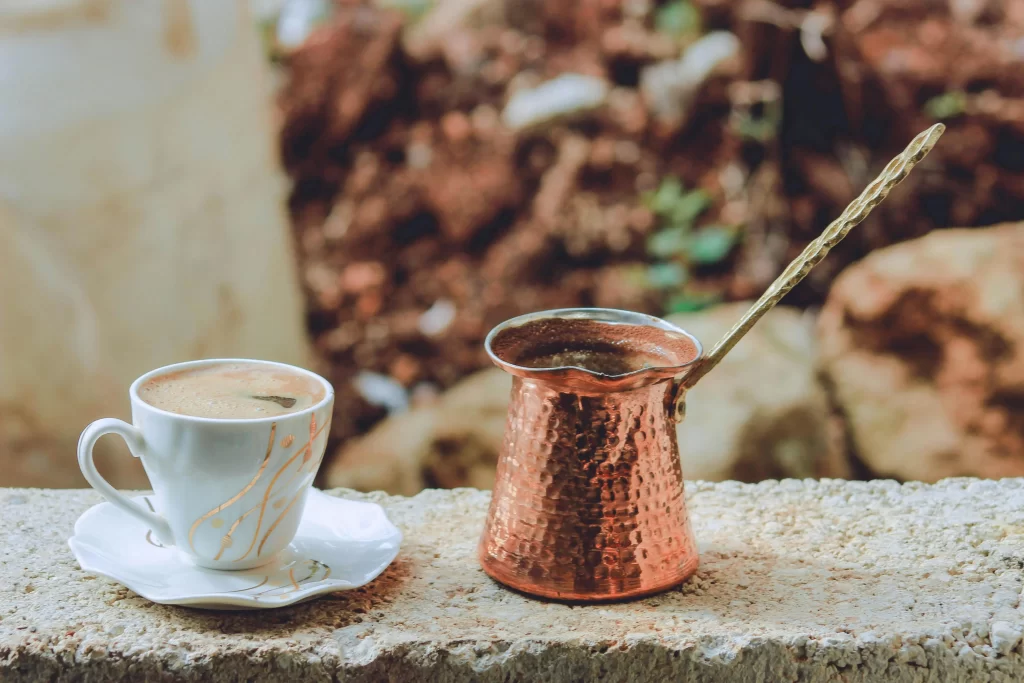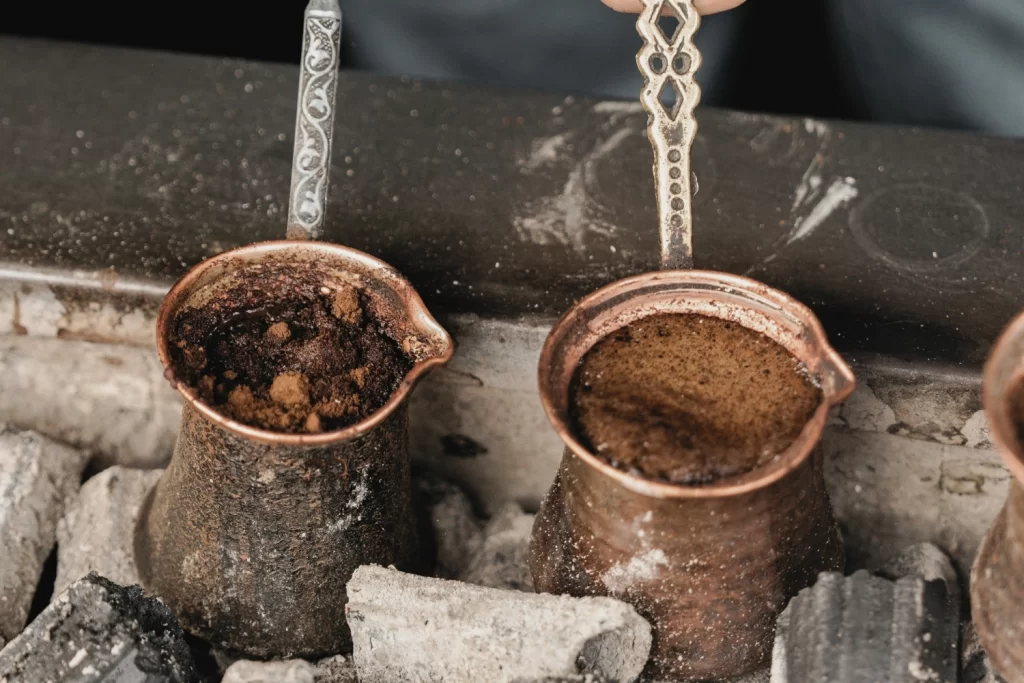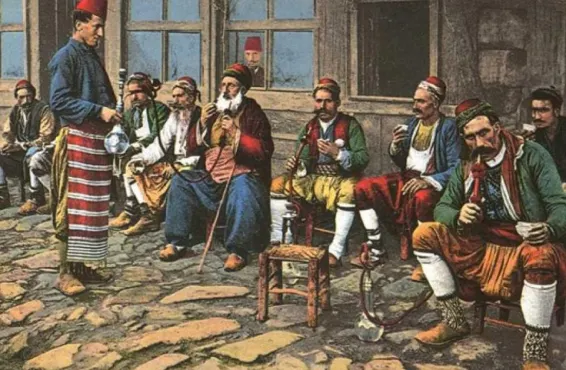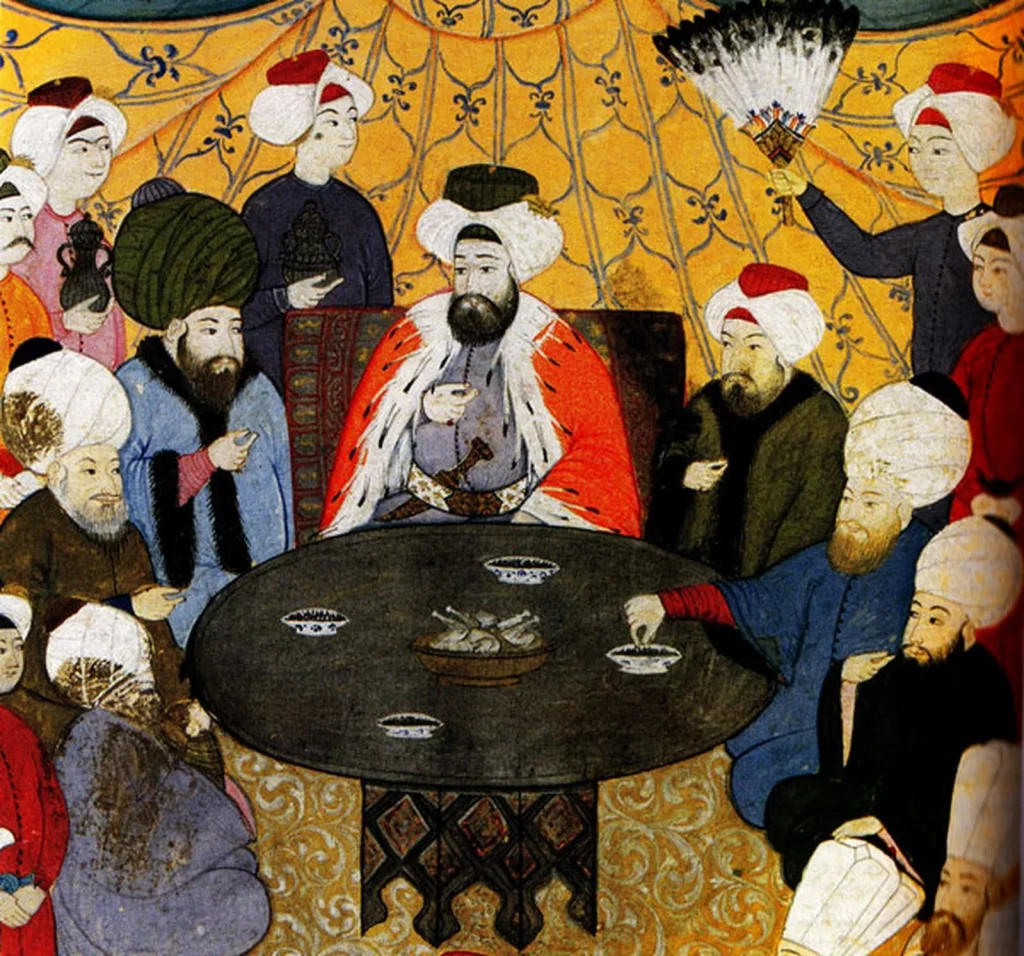A Sip of Culture & Tradition
Have you ever had a cup of Turkish Coffee? If so, you are going to understand what we are going to write about. Let’s make some non Turkish coffee drinkers a bit jealous then. If you’ve drunk this, it means you’ve experienced more than just a hot drink. You have actually tasted centuries of history, culture and tradition brewed in a copper pot. This delicious coffee has captured the hearts of many people. It’s offering far more than just a caffeine boost. What actually makes this coffee so special? How has it been important in Turkish culture for hundreds of years?

How Turkish Coffee Came from Yemen to Istanbul
The history of Turkish coffee dates to the 16th century, when coffee beans were brought from Yemen to the Ottoman Empire, Istanbul. The recipe for it had been discovered in the palaces of Istanbul where it was expertly made and presented in exquisite cups. Its fame and fragrance soon extended outside the palace walls and into ordinary life. Istanbul’s coffeehouses, were social hubs known as “kahvehane” (kahve means coffee, and hane means house). A gathering of merchants, intellectuals, and artists took place to talk politics, sip coffee, and share memories.
Traditional Turkish Coffee Brewing Techniques
Turkish coffee stands out for its unique brewing process. Its brewed traditionally in a copper pot called a “Jazwa,” Finely ground coffee is cooked over low heat, and as soon as it begins to boil you take it of the stove and pour it in to its cup. In result, a rich tasty foam forms on top and the coffee grounds settle at the bottom of the cup. The foam and the coffee grounds give a bold and distinct flavour.
Well, this process isn’t just about making coffee; in one way it’s an experience and a way to learn patience. In modern coffee machines you just put coffee, water and sugar which is optional. When it’s done it rings and you drink your coffee. But in the traditional way you need to pay close attention to the heat and timing, so it doesn’t overflow. Indeed, the lesson of patience that Turkish coffee teaches is a topic we could dive into but let’s leave that to another article.

Coffee and Conversation
In the Turkish tradition, serving coffee is a symbol of hospitality, welcoming guests with care and respect. As we wrote, Turkish coffee is more than just a drink. It is a means of socializing… . Whether coming together with old friends or greeting someone new, a cup of Turkish coffee carries deep meanings. As a Turkish proverb says: “A cup of coffee holds forty years of gratitude.” (Bir fincan kahvenin kırk yıl hatırı vardır.)
One well-known tradition involves marriage proposals. The bride-to-be prepares Turkish coffee for her suitor. For a playful twist, she sometimes adds salt or pepper instead of sugar, testing the groom’s patience and sense of humour. This charming custom highlights how coffee helps foster connections
Another lesser-known and forgotten tradition among Turks, dating back to the Ottoman period, involves determining whether the guests are hungry or full. Upon entering the home, guests were immediately offered Turkish coffee. As is customary, water was also served alongside the coffee to help cleanse the palate. However, for this tradition, the order in which the guest chose to drink was key. If the guest drank the water first, it signalled they were hungry, and a meal would be prepared. If they drank the coffee first, it meant they were already full.
Fortune-Telling From a Cup of Coffee?
Turkish coffee offers more benefits than just a caffeine boost and friendship. After the last sip, the grounds left in the cup are used for fortune-telling, Turks call it ‘fal.’ The cup is flipped onto its own saucer. As the grounds cool, it shapes a mysterious form. The patterns are then used to predict the drinker’s future, making the coffee experience more fun and maybe mystical. The origin of fortune-telling comes from the ancient times, long before the world was introduced to coffee itself.
Although this practice has become a tradition, obviously there are those who oppose it and avoid it due to the Islamic prohibition on fortune-telling. Fortune-telling is seen as something to avoid because it involves relying on other sources besides Allah (God) for knowledge of the future. Most people know it’s not permissible but some still engage in it for the sake of conversation, as there is a popular Turkish saying: “Don’t believe in fortune-telling, but don’t go without it either.” (Fala inanma, falsız da kalma.)

The Global Recognition of Turkish Coffee
UNESCO added Turkish coffee to its Intangible Cultural Heritage list in 2013, officially recognizing its cultural significance. This global acknowledgment introduced Turkish Coffee it to a worldwide audience. So, it was already known in Europe even in the Ottoman era. The Venetian merchants, who loved the taste carried coffee back to Venice from Istanbul in 1615. It was the first for the Europeans to taste Turkish coffee. Following that, in 1645, the first coffeehouse in Italy was opened. In 1671, The first coffeehouse of Marseilles opened.
Sultan Mehmed IV sent an ambassador to Paris in 1669, and he took sacks of Coffee with him. He described it to the French as a ‘magical beverage.’ The ambassador Suleyman Ağa was loved and became a darling of Parisian aristocrats. Eventually in 1686 the first coffeehouse opened in Paris. England first came across with coffee in 1637. A Turk introduced the drink to Oxford. It got popular quickly among the students and teachers that they establish a coffee club; “Oxford Coffee Club.” Then in 1650 they opened a coffeehouse called “Angel” in Oxford. In 1652, a Greek man who learned how to make proper Turkish coffee opened the coffeehouse in London. After the 1660’s coffee became a part of social culture surrounded by intellectual conversations. Eventually in time, different cultures started making their own versions of coffee…
Today, Turkish coffee is enjoyed far beyond Turkey itself. Its strong, aromatic flavour and unique brewing method have made it a favourite in cafés and homes worldwide. However, the new generation, tends to prefer drinking espresso, which shares some similarities with Turkish coffee. Whether in the bustling streets of Istanbul or in cafés across Europe, Turkish coffee remains a symbol of Turkey’s enduring cultural influence.

Why Turkish Coffee Still Matters
So, what makes Turkish coffee stand out in a world full of different coffee choices? As we said, it’s the deep connection to culture, tradition, and community. Every cup has a story, it tells us a story of history, hospitality, and human connection. In the chaos of the world, the slow, deliberate process of brewing coffee reminds us to savour the moment, enjoy our surroundings, and engage in meaningful conversations.
Turkish coffee is more than a beverage. Ok, let’s agree to prepare it quickly using a Turkish coffee maker rather than a copper pot. Again, it is about the moments and connections created around it from the hands that brew it to the friends who share it. In every sip, and in every conversation, you continue a tradition that has continued for centuries.
Today, for most elderly people in Turkey, coffee remains an indispensable tradition. They wake up in the morning, and after their prayers and breakfast, they brew their coffee and enjoy it by the window or in front of the television. Interestingly, the word ‘kahvaltı’ (which means breakfast) comes from the phrase ‘before coffee.’ However, in some households (and in my grandparents’ house), coffee is enjoyed before breakfast.
So, next time when you are enjoying a cup of Turkish coffee, remember it is more than just coffee. It is a way of life for Turks.
My latest article The Legendary Story of Turkish Delight
If you have any feedback or suggestions, feel free to email me at mr.omerguler@gmail.com.
















